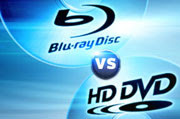
At a board meeting today in Tokyo, Toshiba decided it would abandon the HD DVD format. A rival blue-laser optical disc technology to Blu-ray Disc, HD DVD was locked in a struggle with Blu-ray to become the next-generation heir to the booming $24 million DVD business (see our timeline of the format war). The format war stretched back to the year 2002, when backers of both formats unveiled their plans for blue-laser-based optical discs.
Toshiba's chief executive Atsutoshi Nishida, addressed assembled media in Tokyo after the board meeting during which the company pulled the plug on its HD DVD support. At the press conference, Nishida noted that the decision to pull out of the HD DVD market was a difficult one, "but when we thought about the trouble we would cause to consumers and our partners, we decided it was not right for us to keep going with such a small presence."
Existing HD DVD players will continue to have support, says Toshiba, although for how long was unclear. (Even more unclear: How long Universal Studios might keep up its support of those nifty interactive features) introduced last year.
Toshiba did not announce any plans to produce its own Blu-ray drives, although it's impossible to imagine that the consumer electronics company will completely abandon the market for movie disc players.
Some historical trivia: HD DVD was initially introduced in 2002 as the Advanced Optical Disc (AOD) format. Toshiba and NEC together proposed this technology to succeed DVD by way of the DVD Forum, an industry forum for governing the standards of the current red-laser DVD technology. For years, that the DVD Forum approved the technology was presented as a strength of the HD DVD format over Blu-ray. (And, in the end, as I expected, it was Toshiba's withdrawal from the market--and not any announcement from the DVD Forum or the HD DVd Promotion Group--that marked the end of the HD DVD format itself. That underscores just how Toshiba was single-handedly propping up the the HD DVD format; without Toshiba's support, the format cannot, and has no reason to, exist.)
By contrast, the companies behind Blu-ray opted from the get-go to bypass the DVD Forum. Instead, Blu-ray's backers formed their own governing body to oversee the developmenet and implementation of the standard--much like the DVD+RW Alliance had done with its non-DVD-Forum backed DVD+R/RW format before it. Blu-ray was initially developed by Sony and Pioneer, but the technology has been championed from the outset by large consortium of consumer electronics companies.
The thing about Blu-ray has been its clear support within the industry from the start. At the International Consumer Electronics Show in 2006, Blu-ray Disc Association head Andy Parsons noted, "The legions of engineers who have been working on this is just astounding. I’ve never seen anything like it. Companies that usually duke it out--competitors--are working together."
Parsons, himself based at Pioneer, went on to say, "It’s been fun to watch it all come together." At the time of these comments, Blu-ray's technical spec had just been finalized.
Now, with Toshiba's announcement, Blu-ray's path is complete. And I can add that this has been one wild ride to observe.
Toshiba's chief executive Atsutoshi Nishida, addressed assembled media in Tokyo after the board meeting during which the company pulled the plug on its HD DVD support. At the press conference, Nishida noted that the decision to pull out of the HD DVD market was a difficult one, "but when we thought about the trouble we would cause to consumers and our partners, we decided it was not right for us to keep going with such a small presence."
Existing HD DVD players will continue to have support, says Toshiba, although for how long was unclear. (Even more unclear: How long Universal Studios might keep up its support of those nifty interactive features) introduced last year.
Toshiba did not announce any plans to produce its own Blu-ray drives, although it's impossible to imagine that the consumer electronics company will completely abandon the market for movie disc players.
Some historical trivia: HD DVD was initially introduced in 2002 as the Advanced Optical Disc (AOD) format. Toshiba and NEC together proposed this technology to succeed DVD by way of the DVD Forum, an industry forum for governing the standards of the current red-laser DVD technology. For years, that the DVD Forum approved the technology was presented as a strength of the HD DVD format over Blu-ray. (And, in the end, as I expected, it was Toshiba's withdrawal from the market--and not any announcement from the DVD Forum or the HD DVd Promotion Group--that marked the end of the HD DVD format itself. That underscores just how Toshiba was single-handedly propping up the the HD DVD format; without Toshiba's support, the format cannot, and has no reason to, exist.)
By contrast, the companies behind Blu-ray opted from the get-go to bypass the DVD Forum. Instead, Blu-ray's backers formed their own governing body to oversee the developmenet and implementation of the standard--much like the DVD+RW Alliance had done with its non-DVD-Forum backed DVD+R/RW format before it. Blu-ray was initially developed by Sony and Pioneer, but the technology has been championed from the outset by large consortium of consumer electronics companies.
The thing about Blu-ray has been its clear support within the industry from the start. At the International Consumer Electronics Show in 2006, Blu-ray Disc Association head Andy Parsons noted, "The legions of engineers who have been working on this is just astounding. I’ve never seen anything like it. Companies that usually duke it out--competitors--are working together."
Parsons, himself based at Pioneer, went on to say, "It’s been fun to watch it all come together." At the time of these comments, Blu-ray's technical spec had just been finalized.
Now, with Toshiba's announcement, Blu-ray's path is complete. And I can add that this has been one wild ride to observe.